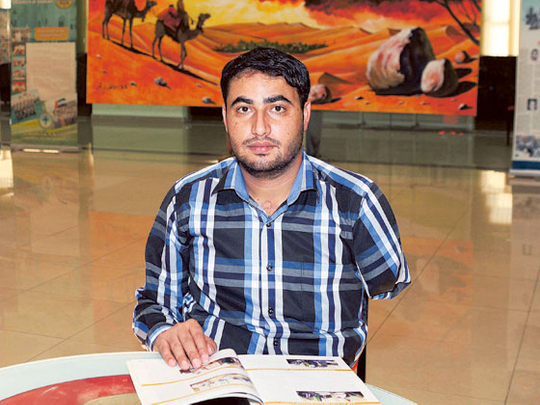
Sharjah: “Should we bury him in Gaza or Saudi Arabia,” is what Jehad Al Salibi remembers hearing as he lay in a coma for over a month.
His thoughts go back to a Friday morning — January 2, 2009. Then a 19-year-old college student, Al Salibi had gone to the petrol station in Al Twam, Gaza, on his bicycle to buy cooking gas for his mother.
And that’s when a rocket struck.
Next thing he knew, he was lying in a hospital bed in Saudi Arabia and his left arm had been amputated — a month had passed since the day he had run the errand for his mother.
Al Salibi, who is now a business student at the University of Sharjah, was one of the many Palestinian civilians who live on with grim reminders of the Israeli air strikes during Israel’s 22-day war on Gaza at the turn of 2008.
The war, which took place from December 27, 2008 to January 18, 2009, saw the death of 1,434 Palestinians, of whom 960 where civilians — among them 288 children and 121 women.
Al Salibi was one of the 5,303 Palestinians injured (1,606 were children and 828 were women) as a result of the war. His case bears an echo for those injured since the Israeli air strikes on Gaza started earlier this week.
“I didn’t know what struck me, but I did know that I was dying.
“I remember seeing a man driving a saloon car. I pointed to him to help me but he seemed scared. He just drove off. I was only conscious for two minutes, but the pain that I felt in those two minutes was unbearable.”
Al Salibi then blacked out and lapsed into a coma. When he awoke a month later, he found himself at the King Faisal Specialist Hospital and Research Centre in Saudi Arabia.
“I could hear everything when I was in the coma. I was aware of what was happening around me and I knew that the doctors were deliberating whether they should amputate both my arm and leg or just my arm.”
Al Salibi was one of the many Palestinians who received treatment in Saudia Arabia courtesy King Abdullah Bin Abdul Aziz.
Al Salibi suffered injuries all over his body as a result of the attack. His left arm was amputated because of gangrene and he also had a big piece of shrapnel removed from the back side of the brain.
He said his leg miraculously healed unlike his arm. He also said he was fortunate that his brain injury caused no lasting damage.
“My case was so hopeless, I heard the doctors while I was in the coma ask each other if I was going to be buried in Gaza or Saudi Arabia. I think I am alive today by chance, because of God’s will and not because of a miraculous medical treatment.”
Al Salibi was a 19-year-old Sharia student at the time he became a target of the Israeli rocket drone. He believes he was targeted deliberately because the rocket was shot directly at him when he was in the middle of the road and no one else was next to him.
“I was shot at for no reason. I am just one of the many Palestinian civilians attacked for being Palestinian. Look at what is happening now in Gaza, look at all the dead and injured. They are all children and civilians, not terrorists or combatants, like they [Israelis] claim.”
He said his story is not much different from the many Palestinian civilians who, he believes, have come under attack yet again for no reason. He believes that what he went through back then is what the injured Palestinians in Gaza are going through right now.
“I call on them, the Palestinians suffering from the attacks, all to stay strong because God will make things better for them. Look at where I was. I was almost dead but now I am pursuing my higher education and fulfilling my dream in the UAE.”
Today, 25-year-old Al Salibi is a senior business student with a GPA of 3.8 out of four.
After recovering from his injuries and moving back to Gaza, he and other Palestinians injured during the war came to the UAE four months later to take part in a computer programme by Lieutenant General Shaikh Saif Bin Zayed Al Nahyan, Deputy Prime Minister and Minister of Interior. In addition to the computer courses, he also received treatment in Al Twam hospital and was given an artificial arm.
Al Salibi was then able to get a scholarship at the University of Sharjah thanks to His Highness Dr Shaikh Sultan Bin Mohammad Al Qasimi, Member of the Supreme Council and Ruler of Sharjah.
“I am grateful for all those who helped me throughout my ordeal. I pray to God to protect my people and help them prevail against the Israelis.”












